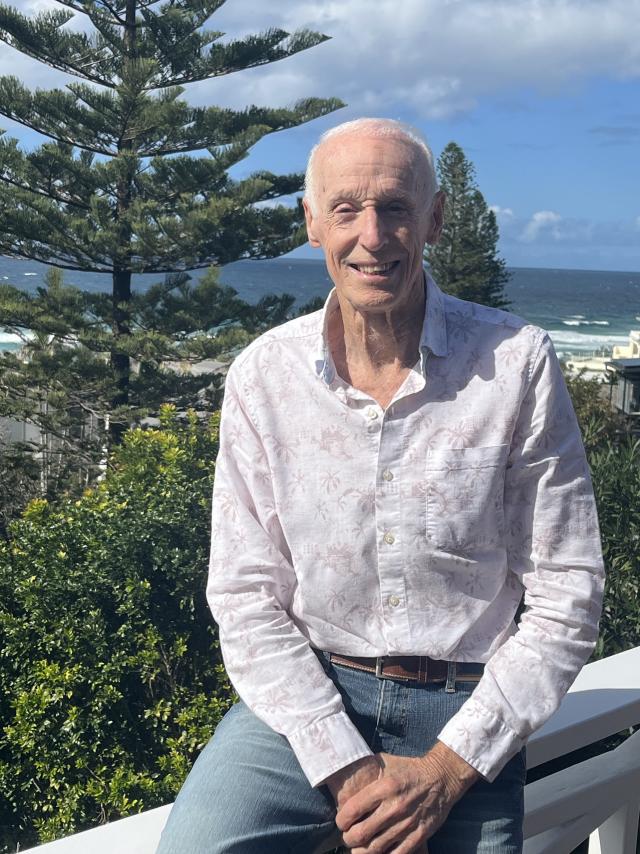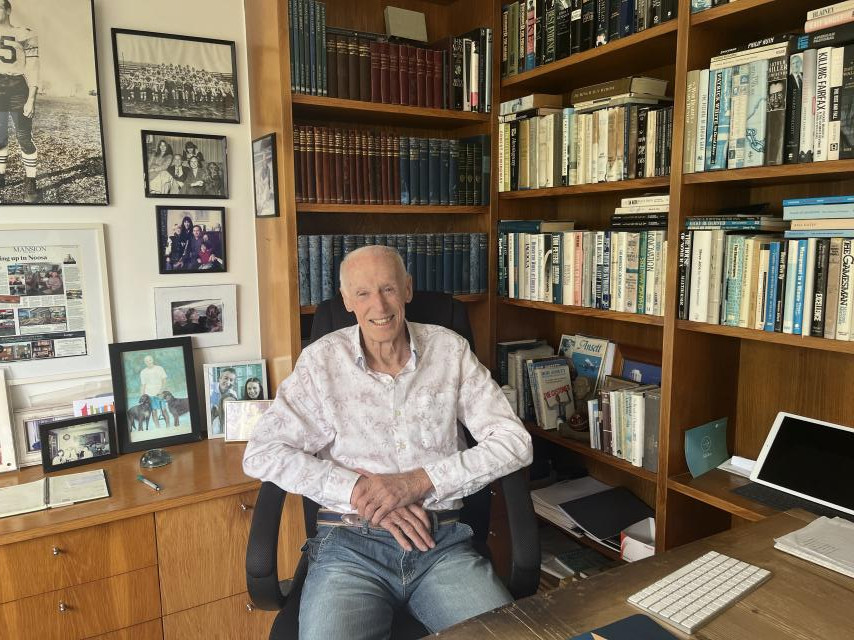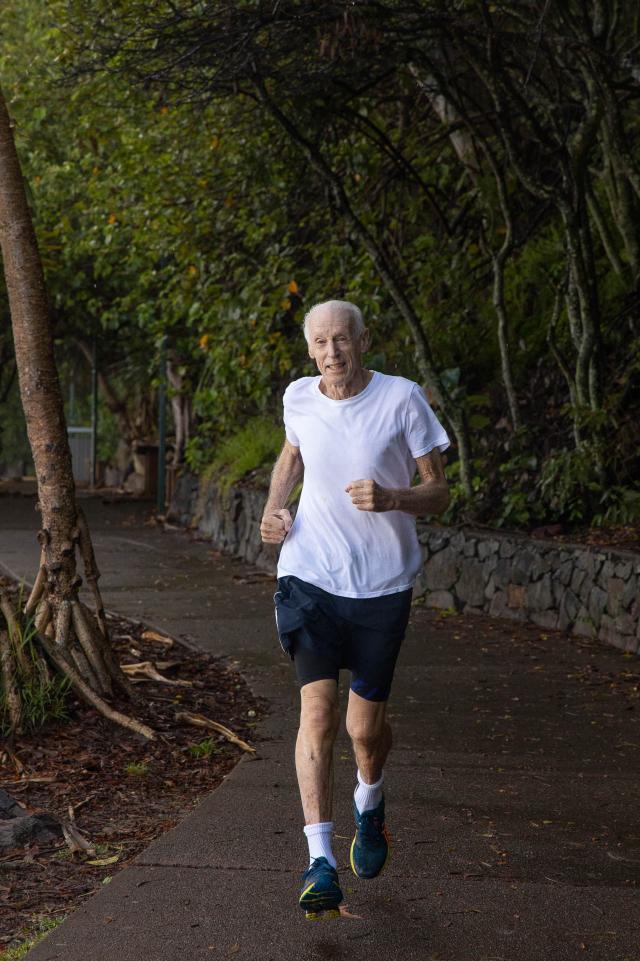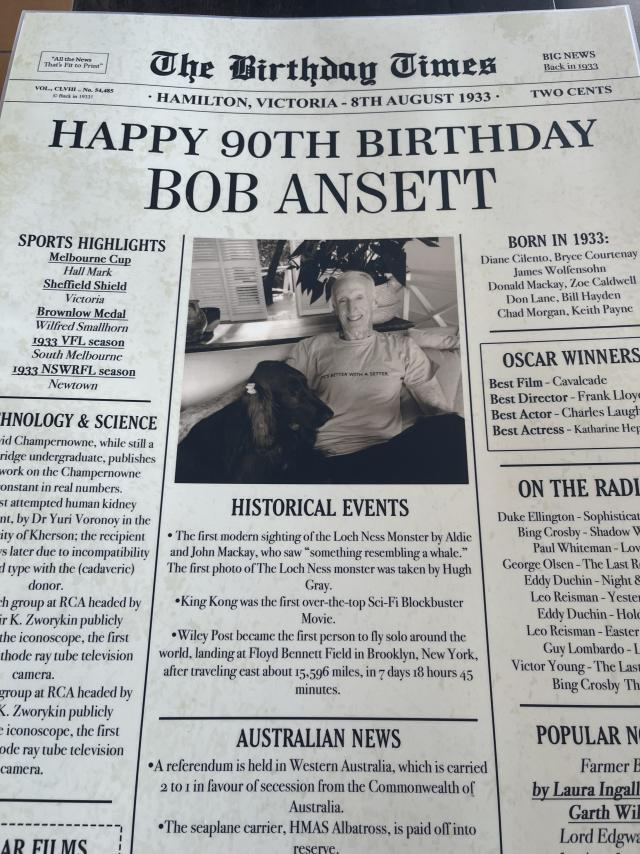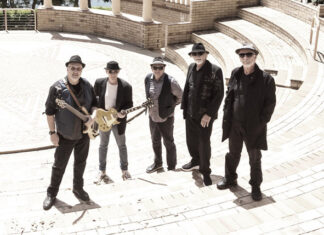A few hours before sitting down to talk about turning 90, Bob Ansett did what he does six days a week, every week: he ran seven kilometres from his Sunshine Beach home through the Noosa National Park to Main Beach, before launching into a strenuous series of sit-ups, stretches and push-ups on the sand and then swimming the length of the beach against a surging current.
If you squinted a bit, you might have thought it was the 17-year-old US paratrooper and gridiron star that Bob once was. A few years back when I wrote about him for Noosa Today I noted that while God rested on the seventh day, Bob plays golf! It was a good line then and an even better one now, because, if possible, he looks even fitter and wirier than he did then.
The founder of Budget Rent A Car, son of the late airline magnate Sir Reginald Ansett, one-time actor, celebrity speaker and local hero of the de-amalgamation battle a decade ago, Bob says he doesn’t think much about becoming a nonagenarian: “I’ve always taken the view that you go through life the best way you can manage, staying healthy and fit, which are the critical components of ageing. I don’t feel 90!”
But he doesn’t mind a celebration, and ahead of last weekend’s party he was thrilled to bits that 21 Ansetts spanning four generations (including seven great-grandchildren) would be gathering under his and wife Josie’s roof, for the first time in the family’s history. “Some of us have never met! They’re coming from all over Australia and around the world,” he enthused.
Despite the fact that he returned from the US nearly 60 years ago, having moved there with his mother in 1945 after his parents’ marriage ended, Bob still retains the soft burr of an American accent, but this wasn’t the only thing he picked up over 20 years of living there. He says: “When we arrived there right after World War II, the country was going through what many historians now regard as the greatest period in America’s history. America was on a roll and there was such enthusiasm amongst the people. I’d just started high school in California and on my first day, like every new kid, I was asked to stand up and tell my classmates about who I was and what my aspirations were. That never happened at Wesley College in Melbourne, so I had to adapt pretty quickly, but that became the baseline for my interest in public speaking, and also the confidence to succeed in business and sport.”
At the tender age of 17 Bob was drafted into the US Army during the Korean War, which he protested as an Australian citizen. He recalls: “They told me I had a choice – I could go into the military or I could go home to Australia. So I joined the paratroopers and was then assigned to Korea. But with the luck that I would enjoy throughout much of my life, they took me off the troop boat at Yokahama where the US Far East headquarters was under General Maxwell Taylor. The general wanted to set up a football team and since I’d been successful playing in high school, I was drafted and I spent the next two years playing football around Japan and running calisthenics classes for about 45 generals.
After his football exploits for the military, Bob was offered three university scholarships and selected the University of Utah “because they had the best coach”. But because he’d been in the military he was older than everyone else and wasn’t comfortable there, so he left and took a string of jobs, one of which was with Standard Oil in California.
He recalls: “I had to spend some time in their service stations, which was very useful to me in later life. That was where I learned that as soon as a customer drove up you sprinted out to fill the tank for them. You wore a beautifully clean white uniform with a black bow tie, and you had to bring a second uniform in case you got a grease spot on the first. That was customer service, and saw immediately that it made perfect business sense. But when I got back to Australia in 1965 I found that it wasn’t really a priority. As we grew the Budget company through the 1970s I made it my priority and set up a major training operation for all employees.”
At that time Avis had the car rental monopoly on all Australian airports, so Bob used the public speaking ability he had learned in high school to mount a campaign against it. He says: “It took me about eight years but we broke the monopoly and three operators were allowed in instead of one. That was the break that Budget needed. I also did my own TV commercials, which was only done by one other CEO back then, and that was Bob Jane. That personal touch allowed us to steal the march from Avis. We had a slogan, “number one in ‘81”, but we got there in 1980.
Giving the generals of the Far Eastern command calisthenics classes during the Korean War was the inspiration for another Ansett innovation that is commonplace in big business today. “I always encouraged my employees to stay fit, and at the time that Budget began to grow very quickly we had a big office in Melbourne. I was the president of North Melbourne football club so I arranged with the club trainer to take our head office people, about 180 of them, to the ground once a week for training sessions. It was optional of course, but a very high percentage came along on a Monday morning. In those days not many corporations were thinking along those lines. I remember one of the big banks put in a gym on their fourth floor and made it available to their employees but no one was interested because the CEO wasn’t interested, whereas I was there leading them every session, and so a lot of my people felt it would be good for their careers to show up! It was amazing how enthusiastic they became. I believe in leading by example.”
Budget survived three recessions but the fourth claimed the founder. He recalls: We’d opened up Budget around the Asia Pacific, in Japan, as well as linkages with Budget in America. Whenever we found ourselves in a recession, I tried to use it as a way to gain market share while our competitors were cutting back. We didn’t make much profit but we came out of it with a much larger market share, which created future profits. That strategy worked well until 1987 when the air traffic controllers went on strike and the pilots followed and the airlines basically closed down. And then the recession hit. At that time I had 12,000 rental cars in my fleet and 7000 of them were sitting idle at airports. It went on for months and I couldn’t get rid of them because no one was buying cars. America was also in recession but nothing like ours, so I went to the US to ask them to come in and take over. They said no so I called in an administrator. They started changing things like the focus on customer service, part of my vision, so it was time for me to go. It wasn’t really the way I’d hoped to leave Budget, but I reasoned if that was the worst possible crisis I’d ever face in business, I never thought, oh there’s no way out of this. I always remained positive. Where there’s a will there’s a way.”
Bob and Josie moved permanently to their Noosa holiday home in the early ‘90s, where he combined a marketing business with regular speaking engagements, and his daily commitment to fitness. Then, in the first decade of the new century, when state-government-imposed amalgamation of Noosa Council with Maroochydore and Caloundra to form the Sunshine Coast “super council” and everything the Ansetts loved about Noosa was threatened, he went back into paratrooper mode and helped lead the campaign through Friends of Noosa. It was a long and hard battle, but Noosa Council was reformed in 2014. Where there’s a will, there’s a way.
Happy birthday, Bob.

